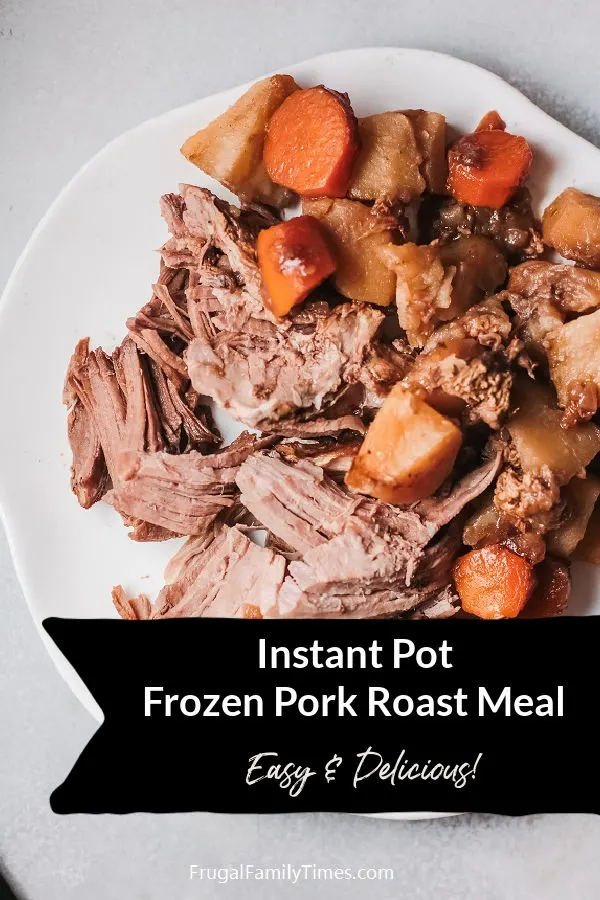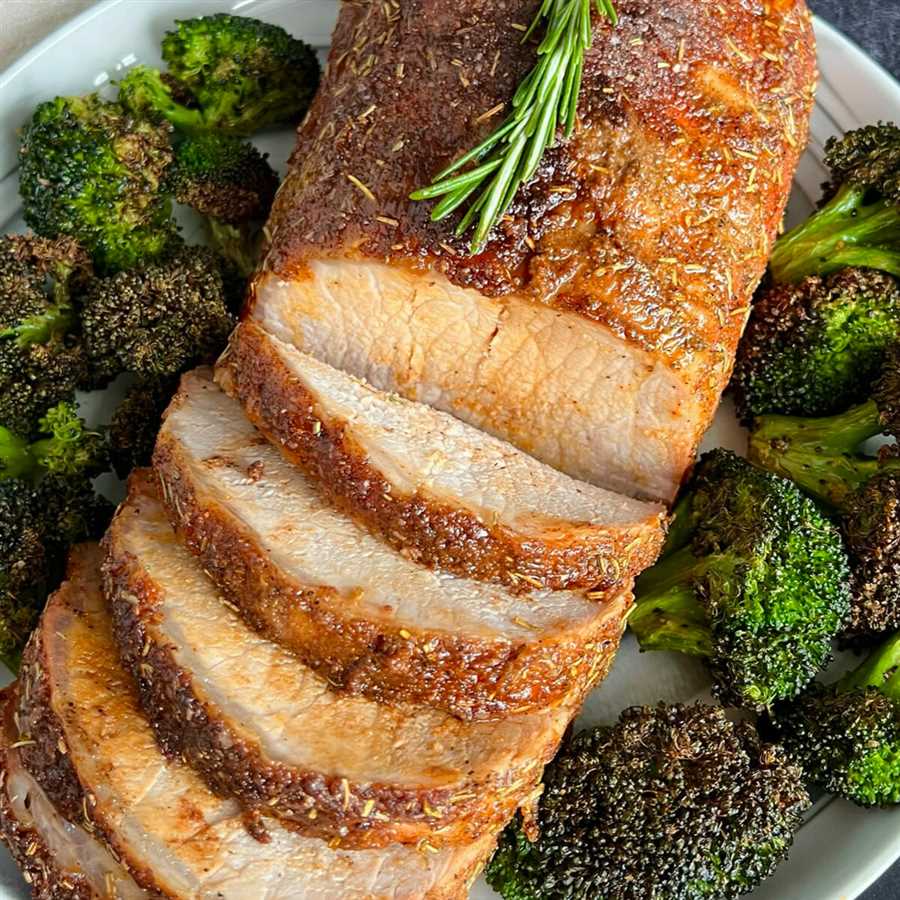





Pork roast is a delicious and versatile dish that many people enjoy. However, sometimes you may forget to thaw your pork roast ahead of time. In such situations, you may wonder if it’s possible to cook a pork roast directly from frozen.
The short answer is yes, you can cook a pork roast from frozen, but it will require some adjustments to ensure that it cooks evenly and safely. It’s important to note that cooking a pork roast from frozen may take longer than cooking a thawed roast.
One method to cook a frozen pork roast is to roast it at a lower temperature for a longer period of time. This allows the heat to penetrate the frozen meat more evenly, preventing the exterior from overcooking while the interior remains frozen. It’s also recommended to use a meat thermometer to ensure that the pork roast reaches a safe internal temperature of 145°F (63°C) to kill any potential bacteria.
In conclusion, while cooking a pork roast from frozen is possible, it requires some adjustments in cooking time and temperature to ensure that it is safe and delicious. By following the proper guidelines and using a meat thermometer, you can enjoy a tender and flavorful pork roast even when it’s frozen.
Why Cook Pork Roast from Frozen?
Cooking a pork roast from frozen can be a convenient and time-saving option for busy cooks. There are several reasons why you might choose to cook a frozen pork roast instead of thawing it first.
1. Convenience
Cooking a pork roast from frozen eliminates the need to plan ahead and thaw it in advance. This can be especially helpful when you are short on time or have unexpected guests. By cooking the pork roast straight from the freezer, you can have a delicious and satisfying meal on the table in no time.
2. Moisture Retention
When you cook a pork roast from frozen, it helps to retain the moisture in the meat. Since the roast is cooking slowly from a frozen state, it has more time to thaw and cook evenly. This can result in a tender and juicy roast, as the moisture is trapped within the meat.
However, it is important to note that cooking a pork roast from frozen requires some extra precautions to ensure that it is cooked safely. It is necessary to adjust the cooking time and temperature accordingly, as frozen meat takes longer to cook than thawed meat. Using a meat thermometer to check for doneness is also recommended, as it may be difficult to determine the internal temperature just by appearance.
To achieve the best results when cooking a pork roast from frozen, consider following a recipe specifically designed for this method. Additionally, be sure to check the packaging or consult a reliable source for any specific guidelines or recommendations for cooking a frozen pork roast.
| Advantages of Cooking Pork Roast from Frozen | Disadvantages of Cooking Pork Roast from Frozen |
|---|---|
| Convenience | Requires adjustment in cooking time and temperature |
| Retains moisture in the meat | May be difficult to determine doneness without a meat thermometer |
| Saves time |
Time-Saving Convenience
One of the biggest advantages of cooking a pork roast from frozen is the time-saving convenience it offers. With our busy schedules, it can be challenging to find the time to defrost meat properly before cooking. By cooking a frozen pork roast, you eliminate the need for thawing, saving you valuable time.
Not only does cooking a frozen pork roast save time, it also makes planning meals easier. You don’t have to worry about defrosting the meat in advance or making sure you have all the ingredients ready. Simply take the frozen roast out of the freezer, and you’re ready to begin cooking.
Safe Cooking Practices

It’s important to note that cooking a pork roast from frozen requires some adjustments to ensure it is cooked safely and thoroughly. The cooking time will be longer compared to a thawed roast, as the frozen meat takes longer to cook through.
To ensure that the pork roast is safe to eat, it’s crucial to use a meat thermometer to check the internal temperature. The United States Department of Agriculture (USDA) recommends cooking pork to an internal temperature of 145°F (63°C) with a three-minute rest time.
Tender and Juicy Results
Cooking a pork roast from frozen can actually result in a tender and juicy meat. The slow cooking process allows the meat to cook evenly and retain its moisture. The result is a deliciously moist and flavorful pork roast that is perfect for serving as a main dish or using in various recipes.
Additionally, cooking a frozen pork roast can help seal in the flavors and juices, resulting in a more flavorful end product. The long cooking time allows the flavors to develop and meld together, creating a mouth-watering roast.
While cooking a pork roast from frozen may require some adjustments and additional time, the time-saving convenience and delicious results make it a worthwhile option for busy individuals or those who simply forgot to defrost their meat in advance.
Locking in Juicy Flavour

When cooking a pork roast from frozen, it’s important to lock in the juicy flavour to ensure a succulent and delicious meal. Here are some tips and techniques you can use to achieve this:
|
1. Seasoning |
Before cooking the frozen pork roast, make sure to season it generously with your favorite herbs and spices. This will help enhance the flavor of the meat as it cooks. |
|
2. Searing |
Start by searing the frozen pork roast in a hot skillet or pan. This will help seal in the juices and create a flavorful crust on the outside of the meat. |
|
3. Slow Cooking |
Once the pork roast is seared, transfer it to a slow cooker or roasting pan. Cooking the meat at a low temperature for a long time will help break down the connective tissues and make the meat tender and juicy. |
|
4. Basting |
While the pork roast is cooking, baste it periodically with the juices from the pan. This will help add moisture and flavor to the meat. |
|
5. Resting |
After the pork roast is done cooking, let it rest for a few minutes before slicing. This will allow the juices to redistribute and result in a more tender and flavorful roast. |
By following these tips and techniques, you can cook a delicious and juicy pork roast from frozen. Enjoy!
Safe and Hygienic Practice
When cooking a pork roast from frozen, it is essential to follow safe and hygienic practices to prevent foodborne illnesses.
Here are some guidelines to ensure the safety and hygiene of your cooking process:
1. Thaw Properly: It is recommended to thaw a pork roast before cooking it, as it allows for more even cooking. Thaw the roast in the refrigerator or use the defrost function on your microwave to speed up the process. Avoid thawing at room temperature, as it can promote bacterial growth.
2. Clean and Sanitize: Before handling the frozen pork roast, wash your hands thoroughly with soap and warm water. Additionally, clean and sanitize all surfaces and utensils that will come into contact with the roast to prevent cross-contamination.
3. Use a Meat Thermometer: To ensure that the pork roast is cooked to a safe internal temperature, use a meat thermometer. The USDA recommends cooking pork to an internal temperature of 145°F (63°C) with a three-minute rest time.
4. Cook Thoroughly: When cooking a pork roast from frozen, it may take longer than usual to reach the desired internal temperature. Make sure to cook the roast thoroughly to kill any harmful bacteria that may be present.
5. Store Properly: If there are any leftover cooked pork roast, store it in the refrigerator within two hours of cooking. To prevent bacterial growth, divide the roast into smaller portions and place them in shallow containers before refrigerating.
By following these safe and hygienic practices, you can enjoy a delicious and safe pork roast cooked from frozen.
Withstanding Cooking Mistakes
When it comes to cooking, mistakes are bound to happen. However, some ingredients can withstand these errors better than others. Knowing which foods are more forgiving can help salvage a meal and prevent a disaster in the kitchen.
| Mistake | Forgiving Ingredient |
|---|---|
| Overcooking | Chicken thighs |
| Undercooking | Ground beef |
| Seasoning error | Potatoes |
| Burnt edges | Baked goods |
| Salting mistake | Tomatoes |
These ingredients have the ability to withstand certain cooking mistakes due to their unique characteristics. For example, chicken thighs are more forgiving when overcooked because they contain more fat and connective tissue, which helps retain moisture. Ground beef is forgiving when undercooked because it can be cooked to a higher internal temperature without becoming tough or dry.
Potatoes are forgiving when it comes to seasoning errors because they can absorb and balance out excess salt or spices. Baked goods, such as cookies or cakes, can withstand burnt edges by simply trimming the burnt parts and still remaining delicious. Tomatoes are forgiving when it comes to salting mistakes because their natural acidity can help counteract an oversalted dish.
By understanding which ingredients can withstand cooking mistakes, you can feel more confident in the kitchen and be prepared to handle any mishaps that may occur. Experimenting with these forgiving ingredients can also help you develop your culinary skills and create delicious meals even in less-than-ideal circumstances.
Question-answer
Can I cook a pork roast from frozen?
Yes, you can cook a pork roast from frozen. However, it will take longer to cook compared to a thawed pork roast. It is recommended to increase the cooking time by approximately 50% when cooking a frozen pork roast.
Is it safe to cook a pork roast from frozen?
Yes, it is safe to cook a pork roast from frozen. However, it is important to ensure that the internal temperature of the roast reaches a safe level to kill any potential bacteria. It is recommended to use a meat thermometer to ensure the roast reaches an internal temperature of at least 145°F (63°C).
What is the best way to cook a frozen pork roast?
The best way to cook a frozen pork roast is to preheat your oven to a higher temperature, such as 450°F (232°C), for about 15 minutes. Then, reduce the temperature to around 325°F (163°C) and continue cooking until the internal temperature of the roast reaches 145°F (63°C).
How long does it take to cook a frozen pork roast?
The cooking time for a frozen pork roast will depend on its size and the recommended cooking time for a thawed pork roast. As a general guideline, you can expect the cooking time to be approximately 50% longer compared to a thawed pork roast. It is recommended to use a meat thermometer to ensure the roast reaches an internal temperature of at least 145°F (63°C).
Can I cook a pork roast in a slow cooker from frozen?
Yes, you can cook a pork roast in a slow cooker from frozen. However, it is important to keep in mind that it might take longer for the roast to cook compared to a thawed pork roast. It is recommended to cook the roast on the high setting for the first 2 hours, and then reduce the heat to the low setting and cook until the internal temperature reaches 145°F (63°C).






